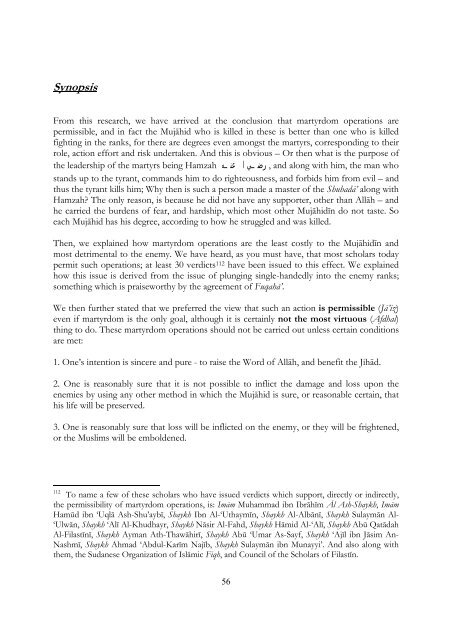the-islamic-ruling-on-the-permissibility-of-self-sacrificial-operations-suicide-or-martyrdom
the-islamic-ruling-on-the-permissibility-of-self-sacrificial-operations-suicide-or-martyrdom
the-islamic-ruling-on-the-permissibility-of-self-sacrificial-operations-suicide-or-martyrdom
Create successful ePaper yourself
Turn your PDF publications into a flip-book with our unique Google optimized e-Paper software.
Synopsis<br />
From this research, we have arrived at <str<strong>on</strong>g>the</str<strong>on</strong>g> c<strong>on</strong>clusi<strong>on</strong> that <strong>martyrdom</strong> operati<strong>on</strong>s are<br />
permissible, and in fact <str<strong>on</strong>g>the</str<strong>on</strong>g> Mujāhid who is killed in <str<strong>on</strong>g>the</str<strong>on</strong>g>se is better than <strong>on</strong>e who is killed<br />
fighting in <str<strong>on</strong>g>the</str<strong>on</strong>g> ranks, f<strong>or</strong> <str<strong>on</strong>g>the</str<strong>on</strong>g>re are degrees even am<strong>on</strong>gst <str<strong>on</strong>g>the</str<strong>on</strong>g> martyrs, c<strong>or</strong>resp<strong>on</strong>ding to <str<strong>on</strong>g>the</str<strong>on</strong>g>ir<br />
role, acti<strong>on</strong> eff<strong>or</strong>t and risk undertaken. And this is obvious – Or <str<strong>on</strong>g>the</str<strong>on</strong>g>n what is <str<strong>on</strong>g>the</str<strong>on</strong>g> purpose <strong>of</strong><br />
<str<strong>on</strong>g>the</str<strong>on</strong>g> leadership <strong>of</strong> <str<strong>on</strong>g>the</str<strong>on</strong>g> martyrs being Hamzah رضي االله عنه , and al<strong>on</strong>g with him, <str<strong>on</strong>g>the</str<strong>on</strong>g> man who<br />
stands up to <str<strong>on</strong>g>the</str<strong>on</strong>g> tyrant, commands him to do righteousness, and f<strong>or</strong>bids him from evil – and<br />
thus <str<strong>on</strong>g>the</str<strong>on</strong>g> tyrant kills him; Why <str<strong>on</strong>g>the</str<strong>on</strong>g>n is such a pers<strong>on</strong> made a master <strong>of</strong> <str<strong>on</strong>g>the</str<strong>on</strong>g> Shuhadā’ al<strong>on</strong>g with<br />
Hamzah The <strong>on</strong>ly reas<strong>on</strong>, is because he did not have any supp<strong>or</strong>ter, o<str<strong>on</strong>g>the</str<strong>on</strong>g>r than Allāh – and<br />
he carried <str<strong>on</strong>g>the</str<strong>on</strong>g> burdens <strong>of</strong> fear, and hardship, which most o<str<strong>on</strong>g>the</str<strong>on</strong>g>r Mujāhidīn do not taste. So<br />
each Mujāhid has his degree, acc<strong>or</strong>ding to how he struggled and was killed.<br />
Then, we explained how <strong>martyrdom</strong> operati<strong>on</strong>s are <str<strong>on</strong>g>the</str<strong>on</strong>g> least costly to <str<strong>on</strong>g>the</str<strong>on</strong>g> Mujāhidīn and<br />
most detrimental to <str<strong>on</strong>g>the</str<strong>on</strong>g> enemy. We have heard, as you must have, that most scholars today<br />
permit such operati<strong>on</strong>s; at least 30 verdicts 112 have been issued to this effect. We explained<br />
how this issue is derived from <str<strong>on</strong>g>the</str<strong>on</strong>g> issue <strong>of</strong> plunging single-handedly into <str<strong>on</strong>g>the</str<strong>on</strong>g> enemy ranks;<br />
something which is praisew<strong>or</strong>thy by <str<strong>on</strong>g>the</str<strong>on</strong>g> agreement <strong>of</strong> Fuqahā’.<br />
We <str<strong>on</strong>g>the</str<strong>on</strong>g>n fur<str<strong>on</strong>g>the</str<strong>on</strong>g>r stated that we preferred <str<strong>on</strong>g>the</str<strong>on</strong>g> view that such an acti<strong>on</strong> is permissible (Jā’iz)<br />
even if <strong>martyrdom</strong> is <str<strong>on</strong>g>the</str<strong>on</strong>g> <strong>on</strong>ly goal, although it is certainly not <str<strong>on</strong>g>the</str<strong>on</strong>g> most virtuous (Afdhal)<br />
thing to do. These <strong>martyrdom</strong> operati<strong>on</strong>s should not be carried out unless certain c<strong>on</strong>diti<strong>on</strong>s<br />
are met:<br />
1. One’s intenti<strong>on</strong> is sincere and pure - to raise <str<strong>on</strong>g>the</str<strong>on</strong>g> W<strong>or</strong>d <strong>of</strong> Allāh, and benefit <str<strong>on</strong>g>the</str<strong>on</strong>g> Jihād.<br />
2. One is reas<strong>on</strong>ably sure that it is not possible to inflict <str<strong>on</strong>g>the</str<strong>on</strong>g> damage and loss up<strong>on</strong> <str<strong>on</strong>g>the</str<strong>on</strong>g><br />
enemies by using any o<str<strong>on</strong>g>the</str<strong>on</strong>g>r method in which <str<strong>on</strong>g>the</str<strong>on</strong>g> Mujāhid is sure, <strong>or</strong> reas<strong>on</strong>able certain, that<br />
his life will be preserved.<br />
3. One is reas<strong>on</strong>ably sure that loss will be inflicted <strong>on</strong> <str<strong>on</strong>g>the</str<strong>on</strong>g> enemy, <strong>or</strong> <str<strong>on</strong>g>the</str<strong>on</strong>g>y will be frightened,<br />
<strong>or</strong> <str<strong>on</strong>g>the</str<strong>on</strong>g> Muslims will be emboldened.<br />
112<br />
To name a few <strong>of</strong> <str<strong>on</strong>g>the</str<strong>on</strong>g>se scholars who have issued verdicts which supp<strong>or</strong>t, directly <strong>or</strong> indirectly,<br />
<str<strong>on</strong>g>the</str<strong>on</strong>g> <strong>permissibility</strong> <strong>of</strong> <strong>martyrdom</strong> operati<strong>on</strong>s, is: Imām Muhammad ibn Ibrāhīm Āl Ash-Shaykh, Imām<br />
Hamūd ibn ‘Uqlā Ash-Shu’aybī, Shaykh Ibn Al-‘Uthaymīn, Shaykh Al-Albānī, Shaykh Sulaymān Al-<br />
‘Ulwān, Shaykh ‘Alī Al-Khudhayr, Shaykh Nāsir Al-Fahd, Shaykh Hāmid Al-‘Alī, Shaykh Abū Qatādah<br />
Al-Filastīnī, Shaykh Ayman Ath-Thawāhirī, Shaykh Abū ‘Umar As-Sayf, Shaykh ‘Ajīl ibn Jāsim An-<br />
Nashmī, Shaykh Ahmad ‘Abdul-Karīm Najīb, Shaykh Sulaymān ibn Munayyi’. And also al<strong>on</strong>g with<br />
<str<strong>on</strong>g>the</str<strong>on</strong>g>m, <str<strong>on</strong>g>the</str<strong>on</strong>g> Sudanese Organizati<strong>on</strong> <strong>of</strong> Islāmic Fiqh, and Council <strong>of</strong> <str<strong>on</strong>g>the</str<strong>on</strong>g> Scholars <strong>of</strong> Filastīn.<br />
56


